Published in Nacional number 633, 2007-12-27
PEOPLE OF THE YEAR
Those who have changed Croatia
Nacional’s selection of Croatians who have left their mark in 2007 with their work in different social spheres
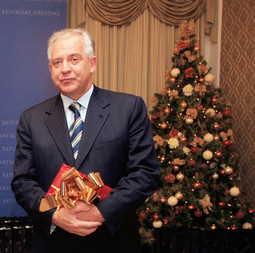 IVO SANADER Prime Minister and president of HDZ basically executed the entire pre-election campaign on his own and won the elections despite different expectations At first glance, there is very little which would connect the Governor of the National Bank Zeljko Rohatinski to national football player Ivan Rakitic, or dramaturge Bobo Jelcic with diplomat Budimir Loncar. But, if you look closer, you can see that these are all individuals who have left their mark in 2007 in Croatia in their work, both in different ways and in different social circles.
IVO SANADER Prime Minister and president of HDZ basically executed the entire pre-election campaign on his own and won the elections despite different expectations At first glance, there is very little which would connect the Governor of the National Bank Zeljko Rohatinski to national football player Ivan Rakitic, or dramaturge Bobo Jelcic with diplomat Budimir Loncar. But, if you look closer, you can see that these are all individuals who have left their mark in 2007 in Croatia in their work, both in different ways and in different social circles.
It is common practice at this time of the year to create a list of the most significant events and individuals. The Nacional editorial office has tried to avoid that dull style where names and events are listed, more such because it is impossible to compare individuals from completely different areas of public life. That is the exact reason we decided – as is done in the Daily Telegraph and other established newspapers – to point out five areas, and mention the three most significant people in each.
This is not a competition; there is no list of winners and losers. Apart from that, there exist few areas such as sports with exact indicators of success or failure, where no one can challenge the fact that Blanka Vlasic is a world champion and a true athletic star.
The Croatian national football team coach, Slaven Bilic, and Premier Ivo Sanader are also included, who have affirmed themselves as winners in their professions, as well as two individuals who are leading Croatia closer to Europe. Slaven Bilic managed to do this in his first attempt, in defeating the English, who also gave Premier Sanader many problems in other areas.
In any case, this is Nacional’s selection of the most significant people in Croatia. They all show how this country has individuals who are capable of coping with international competition, and do something good in different areas.
POLITICS
EU advocate receives a new mandate
Ivo Sanader, Prime Minister and HDZ president is, without a doubt, the most successful politician in 2007. Back in June, he trailed behind SDP by more than 10%, and only a few analysts believed in his victory in the elections.
Despite such expectations, Sanader carried out the pre-election campaign almost alone, and after 25 November, he completed the majority of the negotiations and secured himself anther mandate as Premier. Contradictory to 2004, when Ivica Racan resigned from power without putting up a fight, HDZ’s mandatory had to invest maximum efforts in the battle against Zoran Milanovic. It is now clear that he is the victor in the personalized campaign.
Despite that, Ivo Sanader represented the main guarantee that the next coalition government with HSS and HSLS would not lead anti-European policy. He is experienced enough to attract Josip Friscic and Djurdja Adlesic, while at the same time, to not allow an idea such as ZERP to threaten Croatia’s path towards the European Union.
The man who led Croatia into the UN Security Council
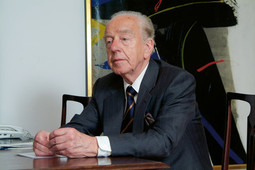 BUDIMIR LONCAR This diplomat and advisor to President Mesic played a major role in the greatest success that the Republic of Croatia has had since gaining international acknowledgement in 1992. Age and experience rarely plays such an important role as it does in politics. Budimir Loncar, an 82 year old diplomat and advisor to President Mesic, has definitely proven this theory because it was his lobbying among the third world countries which deserves the most merit for Croatia’s acceptance into the UN Security Council. Over the past year, Loncar has travelled from Pakistan and Ghana to New York, and in various meetings he secured support from non-aligned and Islamic countries. This is the crowning achievement in the final Yugoslavian Foreign Affairs Minister’s career, who has been active in diplomacy since 1949. Despite accusations that he did not fully support Croatia in 1991, he was accepted by Tudjman and Mesic, and the results of his one-year lobbying proved why. Entrance into the Security Council is the greatest diplomatic success since recognition in 1992.
BUDIMIR LONCAR This diplomat and advisor to President Mesic played a major role in the greatest success that the Republic of Croatia has had since gaining international acknowledgement in 1992. Age and experience rarely plays such an important role as it does in politics. Budimir Loncar, an 82 year old diplomat and advisor to President Mesic, has definitely proven this theory because it was his lobbying among the third world countries which deserves the most merit for Croatia’s acceptance into the UN Security Council. Over the past year, Loncar has travelled from Pakistan and Ghana to New York, and in various meetings he secured support from non-aligned and Islamic countries. This is the crowning achievement in the final Yugoslavian Foreign Affairs Minister’s career, who has been active in diplomacy since 1949. Despite accusations that he did not fully support Croatia in 1991, he was accepted by Tudjman and Mesic, and the results of his one-year lobbying proved why. Entrance into the Security Council is the greatest diplomatic success since recognition in 1992.
A politician with the fastest acceleration in the history of Croatia
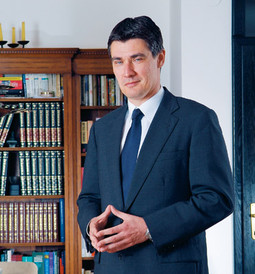 ZORAN MILANOVIC has completely altered the political picture in the country with his appearance Since the end of the 1980’s and the appearance of Franjo Tudjman, there has not been a politician with such a fast ascent. If anyone had foreseen one year ago that Zoran Milanovic – who was only one of Racan’s colleagues at the end of last year – would become the head of the opposition in mid-2007, he would be called crazy. The concurrence of events and with support from the media, Milanovic’s appearance has changed the political picture in the country over the past several months, threatened HDZ, and weakened HNS. It was clear in the campaign that Milanovic is still not capable of being a leader. He made many mistakes. Instead of attacking HDZ for corruption and offering a different picture of politics, he confronted the Church and distanced himself from Milan Bandic who would have strengthened SDP’s campaign. The post-election stubbornness and idea that he would create the new Government instead of Sanader led to the wearisome question of whether Milanovic will ever have such as good chance as he did on 25 November.
ZORAN MILANOVIC has completely altered the political picture in the country with his appearance Since the end of the 1980’s and the appearance of Franjo Tudjman, there has not been a politician with such a fast ascent. If anyone had foreseen one year ago that Zoran Milanovic – who was only one of Racan’s colleagues at the end of last year – would become the head of the opposition in mid-2007, he would be called crazy. The concurrence of events and with support from the media, Milanovic’s appearance has changed the political picture in the country over the past several months, threatened HDZ, and weakened HNS. It was clear in the campaign that Milanovic is still not capable of being a leader. He made many mistakes. Instead of attacking HDZ for corruption and offering a different picture of politics, he confronted the Church and distanced himself from Milan Bandic who would have strengthened SDP’s campaign. The post-election stubbornness and idea that he would create the new Government instead of Sanader led to the wearisome question of whether Milanovic will ever have such as good chance as he did on 25 November.
ECONOMICS
Export success by the President of Ericsson Nikola Tesla
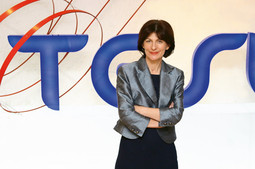 GORDANA KOVACEVIC, for the past three years, has been the President of one of the most successful companies within the Swedish Ericsson corporation and the only female President of a large company in Croatia Gordana Kovacevic is the Executive President of Ericsson Nikola Tesla, a company which is still the leading Croatian exporter of value added products – knowledge – which has a special significance in a country which imports twice as much as it exports. Gordana Kovacevic has been leading one of the most successful companies within the Ericsson Corporation for the past three years, with a strong presence in the markets of the former Soviet Union; she is the only woman in Croatia leading such a large company, which falls within the group of the most successful companies within the Swedish corporation.
GORDANA KOVACEVIC, for the past three years, has been the President of one of the most successful companies within the Swedish Ericsson corporation and the only female President of a large company in Croatia Gordana Kovacevic is the Executive President of Ericsson Nikola Tesla, a company which is still the leading Croatian exporter of value added products – knowledge – which has a special significance in a country which imports twice as much as it exports. Gordana Kovacevic has been leading one of the most successful companies within the Ericsson Corporation for the past three years, with a strong presence in the markets of the former Soviet Union; she is the only woman in Croatia leading such a large company, which falls within the group of the most successful companies within the Swedish corporation.
The leadership team this year closed two large deals. At the beginning of the year, the central IT system for basic medical care began operating, developed in the Ericsson Nikola Tesla laboratory and valued at approximately €7 million, which should lead to a revolution in the Croatian health care system over the next several months. This is the first phase of an electronic network of government institutions in health care, doctors’ offices, hospitals, pharmacies and laboratories in a mutual IT system which will allow electronic health records for all patients, better control of expenses and quicker and more efficient work by medical practitioners.
Furthermore, ten days ago, Gordana Kovacevic released a network created by the new Kosovo GSM operator Ipko. Ericsson Nikola Tesla constructed a complete network for Ipko, and the €37 million job was completed by the Croatian company in six months and represents the largest Croatian investment in Kosovo to date.
Gordana Kovacevic’s entire life is connected to the company she has been leading since 2004, when she took over the role of President from Swede Åke Enella. She grew up in the Tresnjevka neighbourhood, right next to the former Nikola Tesla factory, went to elementary school near Tesla, for her final years of university she received a scholarship through Tesla, and got her first job at Tesla upon completion of her studies.
Gordana Kovacevic was the Vice-President of the Central European Market Unit for years which includes Ericsson’s companies from eight countries.
She was once offered to lead the global Ericsson organization from London or Stockholm, but she refused because, as she announced two years ago, she had a vision of creating a centre of excellence in Croatia. As things stand, she has managed to successfully turn her vision into reality.
Architect of the recovery of the petrochemical giant
Robert Jezic is on the best path to turning the previously devastated Dioki into a regional petrochemical giant. Jezic is doing this discretely. Even though he is the owner, he rarely appears in the media and is rarely seen in the public because that is all done by his managers. But, Jezic stands behind everything which is happening in Dioki.
The recovery of Dioki is important for two reasons: that company is one of the largest exporters, and deals with the production of materials without which life today would become unbearable, such as plastics and rubber. Experts with unique knowledge in the field have started returning after the recovery of the petrochemical industry in Croatia, because they were formerly forced to leave the country during the 1990’s.
This year, Jezic started a large investment cycle in Dioki; he spent €18 million in the modernization of the facilities on the island of Krk, and he plans to invest another €65 million over the next three years. In the same period, Dioki will employ 600 workers. Jezic entered the world of international business with help from his job as a skipper which he did as a student. As he claimed, that job brought him many contacts with business people. That is how he became the director of the Philipp Brothers office in 1985, and went to Milan in 1989 to the Petraco company where he became director of the petrochemical department. From 1992 until 2004, he worked for the Swiss Landmark Chemichals and worked mostly with the company which he owns today.
A banker who raised the moral of a nation
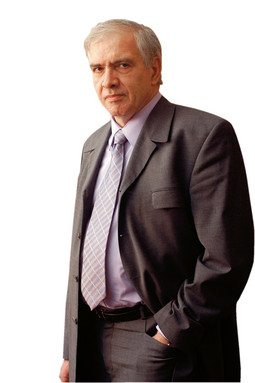 ZELJKO ROHATINSKI refused to give his approval to the Bayerische Landesbank, the principle bank of the Free State of Bavaria, for them to enter the Croatian markets again until they apologize to the Croatian public Zeljko Rohatinski, known by the general public mainly as a boring banker and the Governor of the Croatian National Bank, disrupted the European financial scene, gave Premier Sanader diplomatic problems, embarrassed one of the European financial giants and raised the moral of the nation this summer with one seemingly bureaucratic move. Rohatinski used his legal authority and refused to give the principle bank of the Free State of Bavaria, Bayerische Landesbank, which purchased Hypo grupa, a licence to return to Croatia. The reason was, as Rohatinski believed, the irresponsible behaviour portrayed by the Bavarians during the crisis of Rijecka Banka in 2000, which they owned. The entire situation would not have drawn so much attention in Europe if it was not dealing with one of the ten largest European banks, which can compare to Croatia in its financial strength. It was clear that Rohatinski was right, which was admitted by management at Bayerische Landesbank when they accepted the Governor’s conditions and publicly apologized to the Croatian public for their actions in the Rijecka Banka affair. Because of this behaviour, many have called Rohatinski a monetary sheriff, even a financial nationalist; however, the fact is that the Governor of the Croatian National Bank was only protecting the dignity of the national banking system. He did not do anything which his colleagues in the west would not have done.
ZELJKO ROHATINSKI refused to give his approval to the Bayerische Landesbank, the principle bank of the Free State of Bavaria, for them to enter the Croatian markets again until they apologize to the Croatian public Zeljko Rohatinski, known by the general public mainly as a boring banker and the Governor of the Croatian National Bank, disrupted the European financial scene, gave Premier Sanader diplomatic problems, embarrassed one of the European financial giants and raised the moral of the nation this summer with one seemingly bureaucratic move. Rohatinski used his legal authority and refused to give the principle bank of the Free State of Bavaria, Bayerische Landesbank, which purchased Hypo grupa, a licence to return to Croatia. The reason was, as Rohatinski believed, the irresponsible behaviour portrayed by the Bavarians during the crisis of Rijecka Banka in 2000, which they owned. The entire situation would not have drawn so much attention in Europe if it was not dealing with one of the ten largest European banks, which can compare to Croatia in its financial strength. It was clear that Rohatinski was right, which was admitted by management at Bayerische Landesbank when they accepted the Governor’s conditions and publicly apologized to the Croatian public for their actions in the Rijecka Banka affair. Because of this behaviour, many have called Rohatinski a monetary sheriff, even a financial nationalist; however, the fact is that the Governor of the Croatian National Bank was only protecting the dignity of the national banking system. He did not do anything which his colleagues in the west would not have done.
A doctor of economic science, Zeljko Rohatinski was appointed Governor in 2000 and is currently carrying out his second six year mandate as Governor. In that period, he became well known for his stubborn attitude towards large banking capital. He also stood his ground in July of this year.
MEDIA
Biased professional
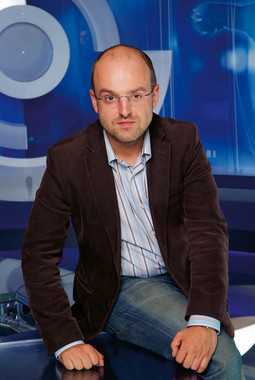 MISLAV BAGO Leading journalist in HTV’s Informational Program proved that you do not have to be neutral if you do your work professionally Over the past year, Bago has established himself as a leading reporter and presenter in HTV’s Informational Program. It is difficult to describe his as unbiased – because he nearly always leans towards the left – but that is a part of his image. ˝Otvoreno¨ is the most watched political talk show, and his interviews with Ivo Sanader and Ivica Racan were the culmination of professionalism on local television.
MISLAV BAGO Leading journalist in HTV’s Informational Program proved that you do not have to be neutral if you do your work professionally Over the past year, Bago has established himself as a leading reporter and presenter in HTV’s Informational Program. It is difficult to describe his as unbiased – because he nearly always leans towards the left – but that is a part of his image. ˝Otvoreno¨ is the most watched political talk show, and his interviews with Ivo Sanader and Ivica Racan were the culmination of professionalism on local television.
His rating is also well known to Hloverka Novak-Srzic, who after returning to HTV fired journalists who were close to left-wing parties, but she did not dare to touch Bago or Zoran Sprajc. Both show that you do not have to be neutral if you work professionally.
Dominant television star on a trip around the world
Everyone who at least once had a chance to be in the company of Goran Milic knows that he is a person who loves to be dominant both in drinking coffee and in television programs. Such professional domination was repeated in the ten episodes of travel to Canada, Alaska and Mexico, while in the summer he travelled throughout the United States of America, from the east to west coast, showing life in the US. If you consider that the entire production team is made up of Milic and his cameraman Dragutin Ramadza, both really deserve compliments.
Milic is an old school journalist, he is very educated about where he is going and he does not ask ridiculous questions. Apart from that, it is nice to listen to a journalist who speaks Spanish with the Mexicans, English with the Americans, and French with the Quebecois. Maybe it sounds cruel, but he leaves a better impression while he is in the Yuma territorial prison than in the HTV studio. Many love him, and many in the same way will not forgive him for the Yutel episode, but he became a Croatian television star.
Premier’s saviour from the press
He is and isn’t a journalist – more correctly, he once worked for HTV but is now the spokesman for the Government and HDZ. In a vital sense, Ratko Macek is to Ivo Sanader that what Alistair Campbell was for Tony Blair. A spin doctor, however much more, the most important colleague and most often, more influential than any other minister.
Macek is an example of professionalism which knows how to cooperate with the media. He is also available, and even when not telling the entire truth, he knows how it’s done in Sanader’s name. He pulled his boss out of the Verona Affair, saved him when the media uncovered that the Premier’s watch collection is worth €100,000, and he thought up the pre-election campaign. Sanader left the impression that he is a real politician in it, as opposed to the poignant Milanovic, which is why he won. In the upcoming years, Macek needs to be careful that his manipulation of the media does not get out of line because, as was the case with Campbell, he could become a former influential colleague of the Premier.
CULTURE
A discovery which is rewriting history
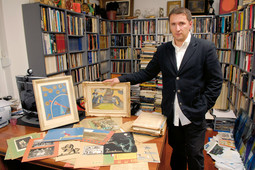 MARINKO SUDAC, a collectioner who uncovered the remains of the Zagreb avant-garde group in Belgrade After two years of dubious research, passionate collectioner Marinko Sudac uncovered sensational remains of the Zagreb avant-garde group Traveleri in Belgrade. Marinko Sudac is originally from Zadar and he began to collect avant-garde items five years ago. His collection totals more than four thousand pieces, and he claims that he got a majority of the works for very cheap because this artwork does not yet have a market value in the region yet. He donated a collection of 300 works by 80 artists to Varazdin as a core for the future museum. The Traveleri group was established by nine high school students from Zagreb in 1922. Sudac uncovered a manifest of the nearly forgotten group, their numerous collages, drama paradigms for the play “I oni će doći (And they too will come)” for which they were expelled from a Zagreb high school and resulted in them moving to Belgrade, the movie scenario for “Glave u vrećama (Heads in Bags)” from 1932, their poetry, photo documentation, and correspondence. After uncovering the remains of the Traveleri, he will have to rewrite his book on the history of avant-garde in Croatia.
MARINKO SUDAC, a collectioner who uncovered the remains of the Zagreb avant-garde group in Belgrade After two years of dubious research, passionate collectioner Marinko Sudac uncovered sensational remains of the Zagreb avant-garde group Traveleri in Belgrade. Marinko Sudac is originally from Zadar and he began to collect avant-garde items five years ago. His collection totals more than four thousand pieces, and he claims that he got a majority of the works for very cheap because this artwork does not yet have a market value in the region yet. He donated a collection of 300 works by 80 artists to Varazdin as a core for the future museum. The Traveleri group was established by nine high school students from Zagreb in 1922. Sudac uncovered a manifest of the nearly forgotten group, their numerous collages, drama paradigms for the play “I oni će doći (And they too will come)” for which they were expelled from a Zagreb high school and resulted in them moving to Belgrade, the movie scenario for “Glave u vrećama (Heads in Bags)” from 1932, their poetry, photo documentation, and correspondence. After uncovering the remains of the Traveleri, he will have to rewrite his book on the history of avant-garde in Croatia.
Concert of the year
Ivo Pogorelic, Croatian pianist who has performed throughout the world’s most renowned concert venues for the past couple of years, has arrived almost in cognito in Zagreb at the end of November. He appeared, as the lights dimmed, in front of the audience of the Lisinski concert hall dressed in a black tuxedo holding a scroll of music notes under his arm. He played clearly and with a sweet sound, and thanks to his characteristic elongated tones his Rahmaninov has exceeded the conventional interpretations. Pogorelic presented himself as a great interpret with a powerful individual dramatic charge, and he was awarded with a ten-minute standing ovation for his performance.
The most awarded theatre tandem
Bobo Jelcic and Natasa Rajkovic have put on a stage of the ZKM theatre play ˝S druge strane (On the other side)˝ which has become the most successful cultural product – they had 24 guest performances and have won 11 awards. This smart, warm and above all amusing play, with a story on the lives of four lonely people, has impressed audiences and critics thus becoming the most awarded and the most viewed theatre play in Croatia. Bobo Jelcic is a director who teaches at the Academy of Dramatic Arts in Zagreb and Natasa Rajkovic has a degree in philosophy and comparative literature and she worked as a translator and radio play writer. They have been involved in theatre since 1993 when they staged in the Gavella Tourist guide, a text by Bothe Strauss. Since1997 they have developed their own expression and so they created a trilogy of a sort – ˝Promatranja (Observations)˝ in the Varazdin city theatre, ˝Usporavanja (Decelerations)˝ at the &TD theatre and ˝Nesigurna prica (An uncertain story)˝, with which they made numerous guest performances at the international festivals thus becoming treated as one of the most interesting theatre products of the new Europe.
SPORTS
World’s queen of athletics
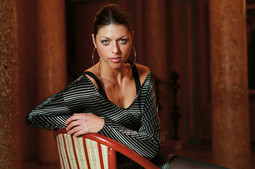 BLANKA VLASIC has been victorious 21 times at competitions around the world this year Blanka Vlasic has marked last year, not only in the eyes of Croatian public, but also in the worlds sports audience. Throughout this year’s competitive season, she has won 21 times: 18 outdoor and 3 indoor meetings. She completed 20 meetings with at least two metres in the high jump competition. She won 18 of the 19 outdoor meetings, and came in second place once which was at the first stop in the Golden League in Oslo.
BLANKA VLASIC has been victorious 21 times at competitions around the world this year Blanka Vlasic has marked last year, not only in the eyes of Croatian public, but also in the worlds sports audience. Throughout this year’s competitive season, she has won 21 times: 18 outdoor and 3 indoor meetings. She completed 20 meetings with at least two metres in the high jump competition. She won 18 of the 19 outdoor meetings, and came in second place once which was at the first stop in the Golden League in Oslo.
She attempted several times to break the world record held by Bulgarian Stefka Kostadinov (209 cm), and the best result this season was attained at the meeting in Stockholm where she jumped 207 centimetres. In the World Championships in Osaka, she won the gold metal with 205 centimetres. Because of that, Blanka Vlasic was proclaimed athlete of the year by the European Athletic Federation. President Stipe Mesic also honoured Blanka Vlasic. He awarded her the Croatian medal of honour of the Order of Danica with the image of Franjo Bucar, among others, for her sports success achieved up to winning the gold metal in the world championship in Osaka.
Blanka Vlasic was born on 8 November 1983 in Split. Throughout 2003, at the age of 20, the then double world junior champion with a record of 201 centimetres became the senior record holder in Croatia both indoors and outdoors. One year later, she competed in the Olympic Games in Athens. In 2005, she created a milestone in her life and career after having her thyroid operated. In January 2006, she jumped 200 cm in the indoor meeting in Moscow, and she set an absolute Croatian record in women’s high jump, jumping 205 cm in Banska Bystrica in February.
New football star
Ivan Rakitic is a member of the Croatian national football team who has been gathering attention due to his exceptional talent and excellent games in Germany, and for his decision to play for Croatia and not for the Swiss national team where he learned to play football. Because of his decision to play for the Croatian national team, his family experienced much pressure and many threats in Switzerland, and his father has still not received Swiss citizenship because of that.
Rakitic is one of the football stars whose best games are still expected. Today, he is already one of the best football players of the Bundesleague in Germany’s Schalke 04. He first played professional football on 29 September 2005 when his former club Basel visited the Siroki Brijeg football club for the UEFA Cup. In the next season, he quickly became one of the best players in the club. His father had a large desire that his son could play for Croatia, while the Swiss wanted the large amount of invested money in the great talent to be returned through his playing the Swiss jersey.
Someone quite different
Slaven Bilic, the Croatian national football team coach, due to his results and approach to work and life, has become the personification of a new, confident and brave Croatia. Despite different expectations, Bilic had no difficulty in making a change in the generation of Croatian national football, and there are expectations that the national team which he is leading will have great results in the next European Football Championship. Bilic comes from a family of intellectuals, he father was a dean, and he graduated from law school. He plays the guitar, loves Iron Maiden and AC/DC, and does not want to talk about his private life. The above average social intelligence was additionally confirmed when he stayed away from politics during the pre-election period, which was not the case with many sports talents.
His success should be the beginning of the end of worn out football officials, who have been leading Croatian football clubs into failure for decades. When he took over the Croatian national team, he was most likely the only person who believed in Slaven Bilic. Today even his greatest opponents admire him, and numerous foreign clubs would love to pay large amounts for his services.
Related articles
Cacic a danger to the coalition: SDP fears a dirty campaign
"I doubt that there is anyone on the Croatian political scene with better ideas and more energy than Radimir Cacic, but I think that we have to be… Više
Latest news
-
28.10.2010. / 14:15
'A profitable INA is in everyone's interest'
-
28.10.2010. / 09:38
Sanader’s eight fear SDP — Won’t bring down Government
-
21.10.2010. / 15:02
Interior Ministry turned a blind eye on Pukanic assassination
-
20.10.2010. / 09:34
Barisic could bankrupt HDZ




